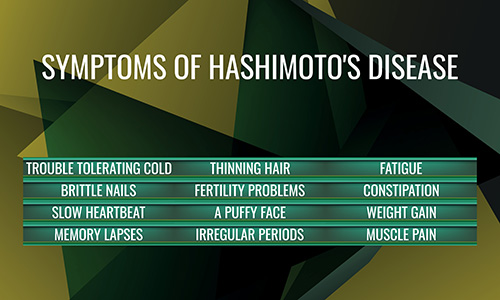
Hashimoto’s Disease, also known as Hashimoto’s Thyroiditis, is an autoimmune condition. It is the most common cause of hypothyroidism, which is in turn the most common form of thyroid disease. It is more common in women than in men. Every year, 35 in 100 women – but only 8 in 100 men – are diagnosed. Overall, it is estimated that 14 million Americans have Hashimoto’s Disease. Untreated Hashimoto's Disease can cause serious heart damage and increase your risk of heart disease.
Your thyroid – a small gland, about the size and shape of a small butterfly, located just under your Adam’s apple – is essential to your overall health. Unlike other hormones, receptors for thyroid hormone are found in every single cell in your body, regulating the function of all organs and systems within the human body.
Thyroid function is complex, and there are many different disease states that can impact the thyroid. There are even other autoimmune diseases - like Hashimoto’s Disease – which impact the thyroid, including Graves’ Disease and Thyroid Eye Disease (TED).
Teasing out whether Hashimoto’s Disease is at the root of your symptoms requires an experienced thyroid specialist. Compile your list of symptoms, and call Water’s Edge Natural Medicine in Seattle, WA at (206) 966-4522 or contact us online.
Hashimoto’s Disease is an autoimmune condition that develops when your body makes antibodies that attack your thyroid gland, usually causing it to produce too little thyroid hormone, leading to hypothyroidism. Without enough thyroid hormone, your body cannot function properly and many processes slow down.
The majority of thyroid patients suffer from hypothyroidism — too little hormone production. Hashimoto’s Disease is the most prevalent cause of hypothyroidism. A much smaller percentage of thyroid patients suffer from Hyperthyroidism, or too much. In extremely rare cases, Hashimoto’s can also lead to hyperthyroidism, which involves overproduction of thyroid hormone.
The cause of Hashimoto’s Disease is an autoimmune response that causes the immune system to attach the cells in the thyroid that produce thyroid hormone necessary for bodily function. The actual cause of that autoimmune response that leads to Hashimoto’s Disease – as with most autoimmune diseases - is not clear. Several risk factors, however, have been identified.
Aging is one of the biggest risk factors for developing Hashimoto’s Disease, as most cases occur after 40. It also tends to run in families, so there is clearly a genetic factor. It frequently strikes during pregnancy, and females are seven times as likely to develop Hashimoto’s Disease than their male counterparts. Having a history of other autoimmune diseases – as seemingly unrelated as rheumatoid arthritis or celiac disease – is another risk factor. Excessive iodine intake and exposure to radiation – and possibly other environmental toxins – has also been linked to Hashimoto’s Disease, as have certain infections or the experience of stress. Unhealthy lifestyle choices are also implicated in the development of Hashimoto’s Disease.
An underactive thyroid (hypothyroidism) – whether caused by Hashimoto’s Disease or another cause – can exhibit any of the following symptoms:
Less often, with Hashimoto’s Disease, you will see symptoms of an overactive thyroid gland, which include anxiety, insomnia, weight loss, diarrhea, sweating, etc.
Because the progress of Hashimoto's disease can be slow, you may not notice any symptoms at all for many years.
During pregnancy, a time when Hashimoto’s Disease can develop, it is important to pay attention to the symptoms, as the disease can cause miscarriage or birth defects, as well as infertility. High cholesterol is another symptom common to pregnant women who develop Hashimoto’s Disease during pregnancy.
We recommend you compile a complete list of your symptoms, medical conditions and medications before your first consultation. We will review your medical history, lifestyle factors, current medications and other health issues you may have.
Generally, a first-line approach to diagnosing Hashimoto’s Disease involves hormone testing. Many patients have had their thyroid values tested and been told that they are "normal." Unfortunately, in conventional medicine, the ranges for "normal" thyroid function are overly broad. In Naturopathic Medicine, we like to see your thyroid hormones in a much narrower range, as this is a better reflection of "optimal" thyroid function.
We use blood tests to determine if you are falling into the optimal range, and also to determine if the cause of your thyroid imbalance is due to an autoimmune condition – like Hashimoto’s Disease.
Our goal, always, is to support the thyroid with natural medications including nutrients and glandular medications. We will discuss your individualized Hashimoto’s Disease treatment protocol in detail, including dosing, treatment duration, possible side effects, as well as a timeline for when you can expect to see effects.
At Water’s Edge Natural Medicine, the course of treating Hashimoto’s Disease and its symptoms will vary with each individual patient. We will create a treatment plan designed just for you. There are many successful approaches we can employ, including:
If you are facing Hashimoto’s Disease, working with a Hashimoto’s Disease specialist who understands the complexity of thyroid function – as well as the treatment options available – is essential. At Water’s Edge Natural Medicine, we offer the most up-to-date and comprehensive testing and treatment to bring restored thyroid health and whole body healing as you recover from Hashimoto’s Disease.
Take the first step today to find out if Hashimoto’s Disease is at the root of your symptoms. If you have questions, we invite you to reach out to us. We will be happy to answer any questions you may have about thyroid function and our methods to restore balance and optimal thyroid health.
Compile your list of symptoms, and call Water’s Edge Natural Medicine in Seattle, WA at (206) 966-4522 or contact us online.